- UNC Libraries
- HSL Subject Research
- Barbara's Basics for Department of Health Sciences

Improve Your Library Research Skills
Barbara's basics for department of health sciences: improve your library research skills, created by health science librarians.

- First Things First: Do This Now!
- Librarians Rock
New to library research? Has it been awhile since you wrote a research paper?
- University of Minnesota Libraries: Library Search Tips (including Boolean searching and more)
- Database Search Tips: Boolean Operators and more (MIT Libraries)
- A tool designed to teach you how to create a search string using Boolean logic. While it is not a database and is not designed to input a search, you should be able to cut and paste the results into most databases’ search boxes.
- Finding Articles & Journals
- Finding Books
Use this guide to help visualize and plan your search:
- Dowload Purdue University Libraries' Search Statement Worksheet (.pdf)
Use this guide to learn to ask good clinical questions and use the PICO format to search for the best evidence:
- Forming Focused Questions with PICO
- Helps you form a focused question that will return relevant results
- Helps you retrieve a manageable amount of results
- Assists you in brainstorming keywords for your research
- Saves time!
Use this log to keep your search organized and to document your search strategy for reporting:
- Sample Database Search Log Sheet
Don't forget, we can get you any article you need.
- Use the 'Find @ UNC' link in database search results to look for full text. See Full-Text Articles via Find@UNC for more information
- When the article is not online, use the options at the bottom of the Find @ UNC page to search the catalog for print or to request the article via Interlibrary Loan.
- Is the book you want in circulation or does the library not own it? Use Interlibrary Loan to place a hold or request a book from another library (free to you).
- Learn more about Interlibrary Loan .
Learn about Scholarly Research Articles.
- Includes a comparison of scholarly journals, professional trade journals, and popular or newstand magazines .
Learn about Primary, Secondary, and Tertiary Sources.
- In this guide from the University of Minnesota Health Sciences Sciences Libraries, Primary, Secondary, and Tertiary Sources in the Health Sciences , learn whether sources are considered primary, secondary, or tertiary depending on the originality of the information presented and their proximity or how close they are to the source of information.
Once you find it, how do you know it is any good?
- How to evaluate information, from social media and internet resources to scholarly articles.
- Learn about Peer Review and how to know if an article has been peer reviewed.
Critical thinking is a key skill in information literacy, along with the related skill of media literacy. Discussion of “fake news” has led to renewed focus on these skills and the importance of colleges and universities providing education in these areas. IFLA, the International Federation of Library Associations has provided this infographic , available in multiple languages, with eight simple steps (based on FactCheck.org’s 2016 article How to Spot Fake News ) to discover the verifiability of a given news-piece in front of you .

By IFLA (http://www.ifla.org/publications/node/11174) [CC BY 4.0 (https://creativecommons.org/licenses/by/4.0)], via Wikimedia Commons
Don't forget, stay organized:
- Register for a free UNC account to try out the bibliographic citation manager Sciwheel
- Sciwheel Guide
- For other options, consult the comparison chart at the bottom of the page on citing & writing tools .
Check our FAQ's
Email us
Chat with us (during business hours)
Call (919) 962-0800
Make an appointment with a librarian
Request a systematic or scoping review consultation
Librarians Rock
Ask Us whenever you need help.
- Chat, email, call or meet with a librarian . We can save you time. We really mean it!

Allied Health Sciences Liaison
Barbara Rochen Renner, PhD

- Barbara's Profile
- [email protected]
- HSL News/Features
- All Allied Health Sciences & Related Guides
- Alternative Academic Careers (ALTAC) Guide
- Appreciative Inquiry & Positive Psychology Resources
- Fogarty Global Health Fellowship Poster Resources
- Implicit Bias Resources
- Qualitative Research Resources
- So You Want to Be a Librarian?
- Writing in the Health Sciences
Health Sciences Library 335 S. Columbia Street Chapel Hill, NC 27599-7585 ( Google Maps for directions )
- << Previous: First Things First: Do This Now!
- Last Updated: Apr 17, 2024 10:22 AM
- URL: https://guides.lib.unc.edu/ahsbasics
Search & Find
- E-Research by Discipline
- More Search & Find
Places & Spaces
- Places to Study
- Book a Study Room
- Printers, Scanners, & Computers
- More Places & Spaces
- Borrowing & Circulation
- Request a Title for Purchase
- Schedule Instruction Session
- More Services
Support & Guides
- Course Reserves
- Research Guides
- Citing & Writing
- More Support & Guides
- Mission Statement
- Diversity Statement
- Staff Directory
- Job Opportunities
- Give to the Libraries
- News & Exhibits
- Reckoning Initiative
- More About Us

- Search This Site
- Privacy Policy
- Accessibility
- Give Us Your Feedback
- 208 Raleigh Street CB #3916
- Chapel Hill, NC 27515-8890
- 919-962-1053

Reading, note-taking and library skills
Enhance your reading, note-taking and library skills to help you to research your assignment topics in a quicker, more effective, way.
- Making effective use of libraries at Oxford
Developing your IT skills
- Reading Skills: using different sources
- Getting started with your reading
- Focusing reading on your essay question
- Accessing reading materials online
- Making effective use of your reading time
- A practical approach to managing your reading time: the 'Pomodoro Method'
- Three top tips for note-taking
- The 'Cornell Method' for note-taking
- Using mind maps for taking notes
Key points for successful note-taking
Making effective use of the libraries at Oxford
As part of your orientation as an Oxford student, take a look at the Getting Started pages to find out how the libraries can help you. For many subjects, departments will schedule library sessions into your induction timetable. Specialist librarians are available to discuss your research topic and literature searching needs as well as offering expert help on how to locate online and print material. Training sessions are also provided for those embarking on independent research.
It is important to develop your IT skills while at university and there are many resources to help you to do so. In addition to software training provided by IT Services, there is a wide range of information skills training available through the Bodleian Libraries’, including practical Bodleian iSkills workshops. You may register for free taught courses or pursue online self-directed courses at your own pace. Visit the IT Services website .
Reading skills: using different sources
Reading is a key academic skill that requires you to be able to identify and find appropriate materials, then prioritise these and then read them with a specific aim in mind, for example research for a tutorial. Thinking about the purpose of why you’re reading what you are can help you to more effectively tackle a reading list.
If you are just beginning to learn about a particular topic you may well be reading to get some background information. If you want a broader context for something you already know lots about, a general text or textbook can be a helpful starting point. If, however, you are looking for particular examples or research data to support an argument or to get into a topic in more depth you should be reading peer-reviewed journal articles and chapters in edited collections.
Getting started with your reading Rather than starting a book on page one and working through it in a linear fashion, look first for key terms relating to your topic, read the beginnings and endings of chapters, and find summaries of the main arguments. Similarly with research papers you may find it helpful to start with the abstract, then read the conclusion and discussion. You will then be primed with a sense of the argument and structure of the book or paper. This should help you both to read more quickly and to engage more closely with the author’s main ideas.
Focusing your reading on the essay question If you are reading materials in preparation for an assignment, such as writing an essay, report or project, then as you read, regularly remind yourself of your assignment brief, such as what the assignment is asking of you; for example ‘write an essay to illustrate the impact of x and y upon z’. This will help you to focus your reading to make sure it is relevant to what you actually need to be preparing.
Accessing online material A lot of what you will be reading may be online and this can create some additional challenges. Do remember that there are a range of technologies available to help make reading on a screen easier including for you. Add-ons such as ‘Immersive Reader’ built into Microsoft Edge and ‘Read Aloud’ to allow you to listen to your readings in Microsoft Office and in Microsoft Edge. If you are using a phone or tablet as an e-reader you might want to try Speak Screen (in the accessibility settings on iOS) or VoiceDream reader to listen to your readings. Further information about assistive technologies to help you study effectively and efficiently at Oxford is available on the IT courses website .
Making effective use of your time Above all, don’t be scared to put a book or a research paper aside and move on to another source if it isn’t relevant or if you’re not finding it useful. You can always come back to it later, or make a note to ask your tutor about it in your next tutorial. Having a specific aim of why you are reading will help you to read more analytically and more effectively. Watch this brief video from the Oxford Study Skills Centre to find out more about how to manage your reading list (2mins 19 sec).
A practical way to manage your reading list: the Pomodoro Method A top tip if you find it hard to concentrate on reading for extended periods is to use something called the ‘Pomodoro method’. This is a technique to focus your studying and it has a few easy steps to follow, as below:
- Choose your reading task and identify how much time you realistically have to spend on it.
- Set a timer for 25 minutes and then read for this length of time without any other distractions—no phones, no social media, no talking—until the timer alarm sounds.
- Take a five minute mini-break from reading. This is then one ‘Pomodoro’ round completed.
- Set the timer again and work solidly for another 25 minutes without distractions, followed by another five minute break.
- Repeat this process, taking a longer break after completing four such ‘Pomodoro’ rounds.
Breaking up a reading task using the Pomodoro method can help if the reading list feels a bit overwhelming or if the material you’re reading is unfamiliar to you. It is also a really useful method if you find you are easily distracted or prone to procrastination. A downloadable handout on the Pomodoro method is available for you here: embed link into text as above
Note-taking: Three top tips
You may find it helpful to develop more strategic approaches to note-taking that are more than simply writing down everything that looks important (strategic note-taking is often referred to as ‘note-making’, rather than note-taking). This can not only help you to focus on the task at hand, but it can also save you time. This section will show you how to do this.
1. Identify the main points When taking notes in a class or lecture, try to identify the speaker’s main points and note them, together with any useful supporting evidence. Don’t try to record everything the lecturer is saying verbatim.
2. Keep a record of all the sources you have read Remember to include full citation details for all your sources, online and in hard copy, and ensure that you note down the page number or URL of each example, argument or quote that you select. This is important as you may need to revisit some sources and so having complete citation information to hand will save you time later on.
3. Avoiding plagiarism When making notes from reading materials, whether those are textbooks, papers or materials online, try to confine yourself to identifying the main points and writing these in your own words. This avoids something called close paraphrasing, which can lead to inadvertent plagiarism . It is really important to make it clear in your notes when you are quoting something verbatim by enclosing the material in quotation marks.
If you are watching recorded lectures there are some ideas to develop your note-taking skills on the Oxford Students website .
A technique for note-taking: the Cornell Method A well-known approach for note-taking is called the Cornell Method (also discussed in the video below) and while it has been designed for classes and lectures, you may also find it useful for taking notes while you’re reading. The idea is that you divide a page up into three sections to create your notes as follows:
Section 1. Notes : make a note of key points from the class or lecture during the session, or make notes whilst you are reading a text.
Section 2. Main Ideas : this is where you make connections and further develop your understanding, for example, in the form of writing down your questions. This is likely to be most helpful for you if you do it after the class or lecture you’ve attended, or having finished your reading.
Section 3. Summary : draft a very short overview of the class, lecture or reading material to make it easier for you to return to your notes at a later date.
Here’s a template for you to download if you’d like to try this approach to note-taking.
A visual method to take notes: using mind maps Some people find taking written notes doesn’t work for them, so you might want to try creating ‘mind map’ notes instead. These are a visual representation of what you’ve noted from attending a class or lecture or having undertaken some reading; the topic is written in the centre and then lines are drawn to indicate connections and their relative importance between your notes.
Watch this five minute video on how to create a mind map . You can also see further examples of mind maps used for note taking on the Open University webpage . If you are using a tablet as an e-reader and to take notes on digital readings you might want to try MarginNote 3 or LiquidText to annotate texts using a keyboard or OneNote or Notability to take hand-written notes. Further information about the study tools can be accessed with your Oxford Single Sign On (SSO) .
- Try not to be a perfectionist. Spending time in a lecture or class trying to perfect your notes may lead you to miss an important point if you’re spending too long writing out one specific point.
- Develop your own shorthand methods to make your note-taking as efficient as possible.
- Don’t worry if your hand-written notes look scruffy – the main thing is that you are able to read and understand them when you come to revisit them later.
- Make a note of the class or lecture, or full citation of your reading material, along with the date at the top of your notes. This will help you keep your notes more organised and make it easier for you to find them at a later date.
- Experiment with different approaches to taking notes – what works for one person may not be the best way for you.
Systems & Services
Access Student Self Service
- Student Self Service
- Self Service guide
- Registration guide
- Libraries search
- OXCORT - see TMS
- GSS - see Student Self Service
- The Careers Service
- Oxford University Sport
- Online store
- Gardens, Libraries and Museums
- Researchers Skills Toolkit
- LinkedIn Learning (formerly Lynda.com)
- Access Guide
- Lecture Lists
- Exam Papers (OXAM)
- Oxford Talks
Latest student news
CAN'T FIND WHAT YOU'RE LOOKING FOR?
Try our extensive database of FAQs or submit your own question...
Ask a question

Introduction to research skills: Home
- Learning from lectures
- Managing your time
- Effective reading
- Evaluating Information
- Critical thinking
- Presentation skills
- Studying online
- Writing home
- Maths and Statistics Support
- Problem solving
- Maths skills by discipline
- Introduction to research skills
- Primary research
- Research methods
- Managing data
- Research ethics
- Citing and referencing
- Searching the literature
- What is academic integrity?
- Referencing software
- Integrity Officer/Panel
- Intellectual property and copyright
- Digital skills home

Research skills allow you to find information and use it effectively. It includes creating a strategy to gather facts and reach conclusions so that you can answer a question.
Starting your research
think about your topic – don’t be too vague or too specific (try mind mapping or keyword searching).
read broadly around your subject (don’t just use Google and Wikipedia). Think about a research question that is clearly structured and builds on literature already produced.
find information using the subject databases. View the Database Orientation Program to learn about databases and using search strategies to refine your search and limit results. View our library tutorial on planning your literature search and look at our library subject guides for resources on your specific topic.
Another good starting point for finding information is our library catalogue Library Search which allows you to search across the library's electronic resources as well as major subject databases and indexes.
carry out a literature review . You may want to include journals, books, websites, grey literature or data and statistics for example. See the list of sources below for more information. Keep a record and organise your references and sources. If you are intending to carry out a systematic review then take a look at the systematic review page on our Research Support library guide.
evaluate your resources – use the CRAAP test (Currency, Relevancy, Authority, Accuracy, Purpose - watch the video, top right).
reach considered conclusions and make recommendations where necessary.

Your research journey.
Why do I need research skills?
they enable you to locate appropriate information and evaluate it for quality and relevance
they allow you to make good use of information to resolve a problem
they give you the ability to synthesize and communicate your ideas in written and spoken formats
they foster critical thinking
they are highly transferable and can be adapted to many settings including the workplace
You can access more in depth information on areas such as primary research, literature reviews, research methods, and managing data, from the drop down headings under Research Skills on the Academic Skills home page. The related resources in the right-hand column of this page also contain useful supporting information.
- Conference proceedings
- Data & statistics
- Grey literature
- Official publications
Books are good for exploring new subject areas. They help define a topic and provide an in-depth account of a subject.
Scholarly books contain authoritative information including comprehensive accounts of research or scholarship and experts' views on themes and topics. Their bibliographies can lead readers to related books, articles and other sources.
Details on the electronic books held by the University of Southampton can be found using the library catalogue .
Journals are quicker to publish than books and are often a good source of current information. They are useful when you require information to support an argument or original research written by subject experts. The bibliographies at the end of journal articles should point you to other relevant research.
Academic journals go through a "peer-review" process. A peer-reviewed journal is one whose articles are checked by experts, so you can be more confident that the information they contain is reliable.
The Library's discovery service Library Search is a good place to start when searching for journal articles and enables access to anything that is available electronically.
Newspapers enable you to follow current and historical events from multiple perspectives. They are an excellent record of political, social, cultural, and economic events and history.
Newspapers are popular rather than scholarly publications and their content needs to be treated with caution. For example, an account of a particular topic can be biased in favour of that newspaper’s political affiliation or point of view. Always double-check the data/statistics or any other piece of information that a newspaper has used to support an argument before you quote it in your own work.
The library subscribes to various resources which provide full-text access to both current and historical newspapers. Find out more about these on the Library's Newspaper Resources page.
Websites provide information about every topic imaginable, and many will be relevant to your studies.
Use websites with caution as anyone can publish on the Internet and therefore the quality of the information provided is variable. When you’re researching and come across a website you think might be useful, consider whether or not it provides information that is reliable and authoritative enough to use in your work.
Proceedings are collections of papers presented by researchers at academic conferences or symposia. They may be printed volumes or in electronic format.
You can use the information in conference proceedings with a high degree of confidence as the quality is ensured by having external experts read & review the papers before they are accepted in the proceedings.
Find the data and statistics you need, from economics to health, environment to oceanography - and everywhere between - http://library.soton.ac.uk/data .
Grey literature is the term given to non-traditional publications (material not published by mainstream publishers). For example - leaflets, reports, conference proceedings, government documents, preprints, theses, clinical trials, blogs, tweets, etc..
The majority of Grey literature is generally not peer-reviewed so it is very important to critically appraise any grey literature before using it.
Most aspects of life are touched by national governments, or by inter-governmental bodies such as the European Union or the United Nations. Official publications are the documentary evidence of that interest.
Our main printed collections and online services are for British and EU official publications, but we can give advice on accessing official publications from other places and organisations. Find out more from our web pages http://library.soton.ac.uk/officialpublications .
Patents protect inventions - the owner can stop other people making, using or selling the item without their permission. This applies for a limited period and a separate application is needed for each country.
Patents can be useful since they contain full technical details on how an invention works. If you use an active patent outside of research - permission or a license is probably needed.

Related resources:
Checking for CRAAP - UMW New Media Archive
How to Develop a STRONG Research Question - Scribbr
Guide to dissertation and project writing - by University of Southampton (Enabling Services)
Guide to writing your dissertation - by the Royal Literary Fund
Guidance on the Conduct of Narrative Synthesis in Systematic Reviews - by ESRC Methods Programme
Guidelines for preparing a Research Proposal - by University of Southampton
Choosing good keywords - by the Open University
Developing a Research or Guided Question - a self-guided tutorial produced by Arizona State University
Evaluating information - a 7 minute tutorial from the University of Southampton which covers thinking critically, and understanding how to find quality and reliable information.
Hints on conducting a literature review - by the University of Toronto
Planning your literature search - a short tutorial by the University of Southampton
Using Overleaf for scientific writing and publishing - a popular LaTeX/Rich Text based online collaborative tool for students and researchers alike. It is designed to make the process of writing, editing, and producing scientific papers quicker and easier for authors.
Systematic reviews - by the University of Southampton.
Create your own research proposal - by the University of Southampton
- Last Updated: Mar 13, 2024 3:14 PM
- URL: https://library.soton.ac.uk/sash/introduction-to-research-skills
Ask Yale Library
My Library Accounts
Find, Request, and Use
Help and Research Support
Visit and Study
Explore Collections
Essential Library Research Skills: Home
- Research a Topic
- Find Journal Articles
- Find Newspapers
- Search Techniques
- Off-Campus Access
- Video Tutorials
- Cite Your Work!
About This Guide
This guide was designed to guide you through a linear research process -- starting with an idea, then using reference sources and books to build a foundation, followed by using scholarly journals to find evidence for a claim. Keep in mind, however, that the research process is rarely linear!
As you go through this guide, try a few of your research ideas in the various sources linked. Keep a notepad ready to make a running list of keywords, phrases, theories, etc. that you can use for searches as you continue your topic investigation.
Your Personal Librarian
All Yale College undergraduates have a Personal Librarian . Reach out to your Personal Librarian if you have questions about:
-Navigating the library
-Finding books and articles
-Formulating a research question
-Managing citations
-Using special collections
Yale University Library
When you need to find books, articles, newspapers, primary sources - anything! - use the Yale Library website as your starting point. By accessing material through the website, you will connect to the material that we have already purchased for you to use! Here are some ways you can get started:
- Ask Yale Library Find answers to common library questions. Includes chat, email, and SMS services.
- Video Tutorials Find short video tutorials on common research needs at Yale Library, including finding books/e-books, articles, digital collections, data sets, and more.
- Quicksearch A single-search option to discover books & e-books, scholarly articles, special collections, and more. A great place to start your research!
- Articles+ Discover thousands of journal articles, newspaper & magazine articles, ebooks, and more. A single-search through *most* of the library's database subscriptions.
- Find Databases Locate a subject-specific database by name (e.g.: JSTOR) or keyword (e.g.: "Art history")
Library Workshops
- Next: Research a Topic >>
- Last Updated: Jan 23, 2024 9:40 AM
- URL: https://guides.library.yale.edu/EssentialLibraryResearchSkills
Site Navigation
P.O. BOX 208240 New Haven, CT 06250-8240 (203) 432-1775
Yale's Libraries
Bass Library
Beinecke Rare Book and Manuscript Library
Classics Library
Cushing/Whitney Medical Library
Divinity Library
East Asia Library
Gilmore Music Library
Haas Family Arts Library
Lewis Walpole Library
Lillian Goldman Law Library
Marx Science and Social Science Library
Sterling Memorial Library
Yale Center for British Art
SUBSCRIBE TO OUR NEWSLETTER
@YALELIBRARY

Yale Library Instagram
Accessibility Diversity, Equity, and Inclusion Giving Privacy and Data Use Contact Our Web Team
© 2022 Yale University Library • All Rights Reserved

- Cambridge Libraries
Study Skills
Research skills.
- Searching the literature
- Note making for dissertations
- Research Data Management
- Copyright and licenses
- Publishing in journals
- Publishing academic books
- Depositing your thesis
- Research metrics
- Build your online profile
- Finding support

Researchers interact with information every day. You might be looking for articles, evaluating sources, writing up work for publication or disseminating your work more widely. And of course the literature does not just consist of books or papers, there's also a lot of research data and grey literature that needs to be processed and distributed appropriately.
We're here to help you find your way in this landscape and make the most of your research opportunities. We have designed these online modules that you can take in your own time. Each one is packed with ideas and tips to help you succeed as a researcher at Cambridge.
Click on the titles on the left to access each module.
How did you find our Research Skills modules
We'd love to hear about your experience on this site to keep improving our offer and to compare it with face-to-face training. Please take the feedback survey , it should only take around 2 minutes to complete.
- Next: Searching the literature >>
- Last Updated: Apr 11, 2024 9:35 AM
- URL: https://libguides.cam.ac.uk/research-skills
© Cambridge University Libraries | Accessibility | Privacy policy | Log into LibApps

- Research Guides
MSc In Management Research Guide
- Core Library Research Skills
Core Library Research Skills for Success
What is information literacy, recommended library research tutorials.
- Literature Searching
- Cited Reference Searching
- Writing Literature Reviews
- Reading & Note Taking
- Find Preprints & Working Papers
- Academic Integrity / Citing Sources
- Explore Research Methods
- Writing Your Thesis / LaTeX Guides
- Find Publishing Opportunities
- Journal Rankings & Impact Factors
- Statistical Software
- Research Data Management
In order to ensure success as a graduate student in a research-based program such as the Msc in Management, you will need to develop your information literacy skills and apply them as part of your course work, the development of your research proposal, literature review, and written thesis.
What is information literacy?
There are a variety of definitions, but the one commonly cited in higher education contexts comes from the Association of College and Research Libraries' Information Literacy Competency Standards for Higher Education".
An information literate individual is able to:
- Determine the extent of information needed
- Access the needed information effectively and efficiently
- Evaluate information and its sources critically
- Incorporate selected information into one’s knowledge base
- Use information effectively to accomplish a specific purpose
- Understand the economic, legal, and social issues surrounding the use of information, and access and use information ethically and legally
Watch this video for an explanation of each of the components of information literacy, and how these components apply to you as a student, and in real life.
Source: Seminole State University Library Creative Commons Attribution License (reuse allowed).
- Library Research Fundamentals (Brock Library Digital Learning) In this lesson, you’ll learn about the fundamentals of library research, including peer review, determining what type of source you need, strategies for finding academic research, and techniques for determining whether a source is appropriate.
- Research Basics: an open academic research skills course (created by JSTOR) Features three modules: - Module 1: Effective Searching - Module 2: Establishing Credibility - Module 3: Citing Scholarly Work
- << Previous: Home
- Next: Literature Searching >>
- Last Updated: Apr 29, 2024 10:30 AM
- URL: https://researchguides.library.brocku.ca/MSCM
University Library, University of Illinois at Urbana-Champaign

Improving Your Research Skills
Introduction, where to get help with your research.
- Ask a Librarian
- Keyword Searching
- Citation Chasing
- Advanced Searching Tools
- Google Scholar
- Other Google Tools
- Evaluate Sources
Improving your research skills takes time and practice. Whether you are searching a library database or exploring Google, it is important to make a plan for your research and understand what kinds of sources you will find. This guide will show you how to search in library databases, search Google using advanced search tools, and evaluate your sources.
- Ask A Librarian The Ask a Librarian chat box is open whenever the library is open. A librarian on chat can walk you through developing your research question, finding and evaluating sources, and creating useful database and Google searches.
- Research Consultations Research consultations are free, 45 minute meetings with a librarian. Librarians can help at any stage of the research process, from coming up with a research question to writing your last citation (or anywhere in between!).
- Office of Undergraduate Research The Office of Undergraduate Research (OUR) holds a variety of workshops throughout the year on research-related topics, including developing research skills, presenting your research, and the value of undergraduate research.
- Savvy Researcher Workshops More than 60 Savvy Researcher workshops happen at the library throughout the year. Sign up for a workshop to learn more about Google for academic research, citation management, healthy research habits, and more!
- Next: Searching Library Databases >>
- Last Updated: Jan 4, 2023 2:21 PM
- URL: https://guides.library.illinois.edu/ourresearchskills

Research Basics: an open academic research skills course
Lesson 1: using library tools.
- Lesson 2: Smart searching
- Lesson 3: Managing information overload
- Assessment - Module 1
- Lesson 1: The ABCs of scholarly sources
- Lesson 2: Additional ways of identifying scholarly sources
- Lesson 3: Verifying online sources
- Assessment - Module 2
- Lesson 1: Creating citations
- Lesson 2: Citing and paraphrasing
- Lesson 3: Works cited, bibliographies, and notes
- Assessment - Module 3
- - For Librarians and Teachers -
- Acknowledgements
- Other free resources from JSTOR
Imagine you’ve been assigned a research paper on the life of a writer you’ve never heard of. What are the first steps you take to find sources? In this lesson, you will learn how to find out what resources are available, how to decide on the best places to search, and how to make sure you have access to the tools you need.
After watching the videos below, you can take the practice quiz for this lesson to test what you've learned. Take the quiz as many times as you need before moving on to the next lesson. You can download the script for the videos to help you study.
Practice Quiz
Watch the introduction to Lesson 1
Watch part 1: subject guides, watch part 2: predict / rank / knowledge, watch part 3: access / ask a librarian.
- << Previous: Module 1: Effective searching
- Next: Lesson 2: Smart searching >>
- Last Updated: Apr 24, 2024 6:38 AM
- URL: https://guides.jstor.org/researchbasics
JSTOR is part of ITHAKA , a not-for-profit organization helping the academic community use digital technologies to preserve the scholarly record and to advance research and teaching in sustainable ways.
©2000-2024 ITHAKA. All Rights Reserved. JSTOR®, the JSTOR logo, JPASS®, Artstor® and ITHAKA® are registered trademarks of ITHAKA.
JSTOR.org Terms and Conditions Privacy Policy Cookie Policy Cookie settings Accessibility

- Joyner Library
- Laupus Health Sciences Library
- Music Library
- Digital Collections
- Special Collections
- North Carolina Collection
- Teaching Resources
- The ScholarShip Institutional Repository
- Country Doctor Museum
Library 101: Introduction to Research: Welcome
- The Library Homepage
- Research Process
- The Library
- Constructing Searches
- Find Articles
- Evaluating Information
- Citation/Plagiarism
Welcome to Joyner Library

Library 101
Library 101 provides you with an overview of the basic library research skills needed to succeed in college. Regardless of your area of study, you can expect the skills acquired in Library 101 to make your searches for relevant and high-quality information for your assignments both simpler and more productive. Library 101 will cover:
The Research Process
Navigating the Library
How to Find Books
How to Find Articles
How to Avoid Plagiarism

NOTE TO FACULTY : Want to add the Library 101 quiz directly to your Blackboard course? Contact David Hisle at [email protected]
Library 101 Outcomes
NOTE TO FACULTY : Want to add the Library 101 quiz directly to your Canvas course? Contact David Hisle at [email protected] .
The purpose of Library 101 is to teach students basic research skills needed to succeed in college. As a result of the Library 101 tutorial, students will master the following skills: navigating the research process, navigating the library, constructing effective searches, finding books, finding articles, evaluating information, avoiding plagiarism, constructing effective citations, and getting help from the library while at ECU.
Please click the tabs of this box, which correspond to the tabs on this website, in order to see student learning outcomes for each library skill.
1) Students will be able to identify 5 important links on the library homepage.
1) Students will be able to describe the research process and selecting a topic.
2) Students will be able to illustrate the information timecycle.
1) Students will be able to identify the locations of the three important areas of the library's homepage (FAQs, Catalog, & Databases) .
2) Students will be able to summarize the purpose of these main library links/tools .
3) Students will be able to locate important sections of the physical library building.
1) Students will be able to construct effective searches in a database.
2) Students will be able to construct a search using boolean operators, including AND, OR, and NOT.
3) Students will be able to broaden and narrow their topic.
1) Students will be able to construct a search in the library catalog.
2) Students will be able to identify the call number from the catalog record and locate it on the shelf.
1) Students will be able to define a library database.
2) Students will be able to locate articles in a database.
1) Students will be able to identify the characteristics of scholarly, popular, and trade articles.
2) Students will be able to identify credible versus non-credible web sources.
1) Students will be able to define plagiarism.
2) Students will be able to discuss the academic integrity policy at ECU.
3) Students will be able to provide examples of intentional and unintentional plagiarism .
4) Students will be able to find citations in the citation style for their major.
5) Students will be able to identify helpful citation tools, including citation generators.
Students will be able to list 6 ways to get help from a librarian.
- Next: The Library Homepage >>
- Last Updated: Feb 5, 2024 2:32 PM
- URL: https://libguides.ecu.edu/library101

A framework to teach library research skills
Embedding library skills within disciplines allows teachers and students to link them to learning outcomes and research requirements. Here, a team of engagement librarians explain how to put a map in place
.css-76pyzs{margin-right:0.25rem;} ,
Karen rolfe, siân furmage, michael latham.

Created in partnership with

You may also like

Popular resources
.css-1txxx8u{overflow:hidden;max-height:81px;text-indent:0px;} A framework to teach library research skills
The trouble with bloom’s taxonomy in an age of ai, emotions and learning: what role do emotions play in how and why students learn, playing the promotion game: how to navigate upshifting, using the snowflake method to build belonging on campus.
Teaching library skills might be ill placed during induction weeks. Rather, evidence suggests that embedding library research and other transferable skills within disciplines supports students’ learning and retention of skills. Using a framework to support embedded library skills teaching in this way is in line with evidence-based practice .
Library inductions at the start of a new academic year are also time and staff intensive. As library educators, we want to be consistent with the content we cover with students at all levels, providing our teaching at a point of need. We want to link the library skills students are developing to their subjects, learning outcomes and assessments that need library research skills (such as finding and citing literature).
- THE podcast: how the university library is an agent of change
- Tips (from a librarian) for creating assignment prompts
- Open access is inevitable – only the ‘how’ remains up for discussion
A library research skills framework provides values, standards and skills for students at all levels (and educators) to work towards; it establishes learner expectations and allows for year-on-year development. A framework can offer a structure for up-to-date and consistent skills training for students. It also gives library and academic staff a clear reference for curriculum mapping to highlight priorities and actions across qualifications, and to identify and open conversations around gaps in students’ library skills.
How we created our library research skills framework
Our library research skills framework describes six areas:
- Transition skills
- Online study
- Finding information
- Evaluating information
- Citing and referencing
- Digital literacy.
Learners should be supported to develop these skills during their undergraduate or taught postgraduate degree programmes. Our framework describes their expected progression, from being a new undergraduate to final-year student and into employment.
Our framework was created after benchmarking other national and international skills frameworks. We asked academic and library colleagues to comment on an initial draft, then incorporated their feedback and piloted the framework with two academic schools. We gathered more feedback from the teaching staff, librarians and students, and incorporated their input into the next iteration. We now have a process to continuously review and develop our framework.
How do we use our library research skills framework?
Our library research skills framework has been instrumental in helping our librarians to create curriculum maps. Librarians have identified the core or compulsory modules within each programme and mapped the learning outcomes to the skill areas of the framework. This allows our librarians to align their teaching, and learners can understand the link between library research skills and their subjects. As a result, librarians’ teaching is, as a whole, more sustainable and provides better quality support for our students.
Ultimately, we want to map out the best path for our learners to acquire library research skills throughout their degrees and into their lives post-qualification. The framework helps us to have conversations with our academics about creating relevant learning outcomes and touch points in their programmes and modules. It includes content, resources and activities pitched at the appropriate level for the learners and which librarians can use in their teaching or academic staff can use independently with their students.
What academics, students and librarians say about our framework
The University of Southampton’s education and student experience committee has endorsed our new approach to embedded teaching of library research skills. Feedback from academics in our pilots indicates that they fully support our approach.
“The library research skills framework is a welcome approach to improving students’ information literacy and awareness of library resources and support…We are keen to move away from overloading students with information during induction and move towards support at the point of need throughout the academic journey,” said a principal teaching fellow for education development in the Southampton Business School.
Our librarians have found the framework a helpful tool in combination with curriculum mapping the programmes they teach on.
“Curriculum mapping has ensured that I teach the library session at the appropriate time and align it with the learning outcomes of the course. Using the framework enabled me to pitch my training session at the right level, and its flexibility means that I can choose the relevant elements according to the experience of the students,“ said an engagement librarian to the School of Psychology.
How to create a library research skills framework
To create a library research skills framework at your university, first decide what skills your learners will need as they progress through their courses and once they go on to employment. Benchmark against other comparable frameworks and find out if you can use any in their entirety or adapt one that is appropriately licensed under Creative Commons as your starting point. Get feedback on your framework from your academics, librarians and students to make sure it meets the needs of your learners and allow it to evolve.
Our framework is a living, evolving document that incorporates developments our learners encounter in their studies, such as generative artificial intelligence. We review and update it twice a year. We are developing our equity, diversity and inclusivity content, for example, working in collaboration with academics to embed teaching on diversifying sources. We are in the early stages of planning a piece of research to evaluate the impact of our framework.
Anna Hvass is head of curriculum engagement ; Karen Rolfe, Siân Furmage and Michael Latham are engagement librarians. All are at the University of Southampton.
If you would like advice and insight from academics and university staff delivered direct to your inbox each week, sign up for the Campus newsletter .
How hard can it be? Testing AI detection tools
How to develop cognitive presence in your learning community, student communication: a compassionate approach, improve your college course for students with add and adhd, a diy guide to starting your own journal.
Register for free
and unlock a host of features on the THE site

ChatGPT for Teachers
Trauma-informed practices in schools, teacher well-being, cultivating diversity, equity, & inclusion, integrating technology in the classroom, social-emotional development, covid-19 resources, invest in resilience: summer toolkit, civics & resilience, all toolkits, degree programs, trauma-informed professional development, teacher licensure & certification, how to become - career information, classroom management, instructional design, lifestyle & self-care, online higher ed teaching, current events, examples of library research assignments.

Every student must develop library research skills in order to complete academic work in most subjects throughout their academic careers. More specifically, they will apply these skills along with library support services when researching information for essays, reports and projects.
However, library research skills are applicable well beyond the classroom, as adults benefit from library research for work as well as for leisure. Students who complete assignments that develop their ability to conduct library research are establishing a lifelong knowledge on how to find, decipher, and interpret information.
There are many ways to develop good library research skills. Here are tips that will help students get started.
Lead with librarians
Librarians are key to the success of assignments for students related to library research abilities. Utilize the opportunity to involve librarians by asking them for ideas for creating assignments. Librarians can also evaluate an assignment to determine its effectiveness and offer advice for making assignments more relevant. Also, contacting a librarian ahead of time regarding an assignment will alert them that students will be in the library doing a particular activity. Creating a partnership with the librarian will be beneficial for students who are dealing with multiple instructors while learning about skills with library research.
Establish concrete objectives
The first step for conducting solid library research is to set concrete objectives. Also, the student must understand what the skill is that they are implementing in an assignment. For example, the student might be learning how to write citations in a bibliography or how to research databases. However, if the assignment makes assumptions that the student already understands the reason for learning these research skills, it will not be as conducive. The assignment must include clear goals, along with supplemental information, such as how the particular skill relates to the library or other academic subjects.
Application of the skill
Learning about any particular research skill can be a tedious chore if the assignment is not made interesting for the student. Integrate a library research activity in with other assignments to create a meaningful connection. For instance, if introducing how to search for scholarly sources, an assignment could be a part of a research project on a topic of interest to the student. Assignments that encourage students to put their new research skill into action have more staying power compared to a straightforward assignment that simply focuses on the skill.
Relevance is key
Making the research skill assignment relevant and exciting to the student is essential. When a new skill for library research is introduced, by incorporating it with other related activities, the student is more likely to recall the skill later on. For example, for an assignment that is focused on how to research primary resources, a trip to a museum or historical site would be highly relevant and interactive. The student would have the chance to see a skill put to use in the real world while learning how to conduct the appropriate steps for success.
Involve library support services
Given that library research skills involve the library, it is only natural to incorporate support services at the library. Involve the library research department and applicable services when creating assignments that teach research skills. For example, a librarian could visit a classroom to teach the students how to look for scholarly reference sources on the Internet. Additionally, librarians may be willing to work with students in groups or individually to conduct research in the classrooms.
Instructors who are tasked to teach skills related to library research, such as the difference in primary and secondary sources or how to conduct scholarly research, have an important job. With preparation and planning, these assignments can be beneficial for students. The most important things to remember when creating these assignments are relevance and application. By creating a partnership with a library and its librarian, instructors are more capable of assisting students with library research.
You may also like to read
- 5 Methods to Teach Students How to do Research Papers
- Examples of Outdoor Activities to Get Your Students Writing
- 3 Examples of Innovative Educational Technology
- Pre-K Home School Curriculum Examples
- 3 Examples of Effective Classroom Management
- Current Events Assignments for Elementary Students
Categorized as: Tips for Teachers and Classroom Resources
Tagged as: Engaging Activities
- Online & Campus Master's in Elementary Educat...
- Degrees and Certificates for Teachers & Educa...
- PhD Programs for Education

Foundational Library Research Skills: Home
Student support.
Get Help with any of the following:
- Assignment Support
- Full Text Access
- Textbook Question
- Library Technical Problem
- 24/7 Online Tutoring
Library Skills Videos


Asking a Librarian

Paul Graham, University Librarian
Email Paul Graham (AST)
Subject Liaison: Creative Arts, Education, Psychology

Kathy Coorsh, Academic Librarian
Email Kathy Coorsh (EST)
Subject Liaison: Business, Interior Design/Decorating & General Studies

Nell Beaudry, Academic Librarian
Email Nell Beaudry (PST)
Subject Liaison: Business, Library Instruction, Information Literacy, Psychology

Melissa Discola, Library Technician
Email Melissa Discola (EST)
Subject Liaison: Textbook Management & Administration

Sarah Van Sickle, Academic Librarian
Email Sarah Van Sickle (EST)
Subject Liaison: Resource Management, Business, Interior Design/Decorating, Creative Arts
What are the Foundational Library Research Skills?
Foundational library research skills for university students encompass a set of essential abilities that enable effective academic research. These skills include information literacy, which involves the ability to locate, assess, and utilize information from various sources, both online and within library collections. University students should also be adept at database searching, using online catalogs, and search engines to find scholarly articles, books, and other academic resources. Proficiency in citation management, critical thinking to evaluate source credibility, and the application of Boolean operators in constructing precise search queries are crucial. Furthermore, students need to master source evaluation, navigate library resources, utilize reference management software, understand interlibrary loan services, and explore subject-specific databases tailored to their field of study. These skills underpin successful research and academic achievement in the university setting.
Select the Image below to find a list of important library skills training videos. These are from the University of Alberta, but are very helpful in providing you with the necessary understanding of the critical information skills you need for success in your work.
What are important Library Research Skills?

Rate this Guide
Related yu links.
Other YU Supports
- Academic Journals and Articles
- APA 7: Understanding the Basics
- APA Support Centre
- Credible Source Guide
- EBSCO Passport
Other Software Options
Citation Software Options
- Zotero: Zotero is freely accessible citation and research management software.
- Endnote : EndNote is a reference manager that helps you save time formatting citations, so you can focus on your research.
- Mendeley : Mendeley brings your research to life, so you can make an impact on tomorrow
- Papers : Papers helps you collect and curate the research material that you're passionate about.
- Last Updated: Jan 17, 2024 3:43 PM
- URL: https://yorkvilleu.libguides.com/QuickStudyGuideonFoundationalResearchSkills
Tutorials: Basic Library Skills
- SUNY Cobleskill's Van Wagenen Library
- Basic Library Skills
- Advanced Library Skills
- Library Search Engine Tutorials
Library Skills Toolkit
Librarians at academic institutions around the world have created hundreds of hours of content intended to help students develop and strengthen basic library and research skills. This toolkit is a carefully-curated collection of interactive tutorials and instructional videos that faculty may use as in-class activities or assign to be completed outside of class time. Likewise, students may consult these materials as reference sources to brush up basic skills or learn new approaches to finding and using information. Most of these materials were developed by librarians at institutions other than SUNY Cobleskill; while they sometimes reference the libraries at other institutions, the bulk of the content covered is applicable to students doing library research and academic writing at any institution.
The majority of links provided here connect users to content offered under Creative Commons licenses. Faculty members interested in embedding this content directly into a Moodle page (rather than merely linking to the original material) are encouraged to carefully follow Creative Commons guidelines for use and attribution.
Topic Selection

Types of Articles

Using Call Numbers

Research Questions

Understanding Plagiarism

(Not) Using Google

Evaluating Sources

- << Previous: SUNY Cobleskill's Van Wagenen Library
- Next: Advanced Library Skills >>
- Last Updated: Apr 12, 2024 3:33 PM
- URL: https://libraryguides.cobleskill.edu/tutorials

Today's Hours
- Centre College Grace Doherty Library
- ACTIVE Library Website
Information Literacy Instruction
- Exercises to Build Research Skills
- Formulate a research topic
- Find Information
- Evaluate Information
- Use Information
- Chicago/Turabian
- Citation Tools
Exercises Overview
Library instruction exercises.
The exercises below are designed for students learning to do research. They can be done in class or assigned as homework. They are in Word format so instructors who wish to use them can easily edit or adapt them. When appropriate, they contain an answer key, so instructors should look at the full handout and remove the answer key before sharing with students.
If you would like a librarian to come to your class to lead these exercises or if you would like an exercise customized for your subject area, contact your Library Liaison!
- Formulate a topic
- Find information
- Evaluate information
- Incorporate information
- Cite information
- Writing assignment formats
- Triangulating your research This exercise guides students with a broad topic to identify search terms and narrow their topic, arriving at a research question.
- Formulating a Research Question from a Broad Topic Students often begin their research (and writing) with a very broad topic. This means they waste a lot of time looking for resources that they will never use. Before they begin to research, it is ideal to have a focused question. This 10 minute assignment teaches them how to turn a very broad topic into a focused research question.
- Identifying and Refining a Research Topic Using Concept Maps This exercise is designed to help students think of words and concepts and see how they are related. They create a concept map of their topic, which may help them see ways to narrow their topic and arrive at a research question.
- Identifying and Refining a Research Topic Using Journalistic Questions Journalistic questions are a set of questions you can use to define your topic more clearly. This exercise will help student ask questions about their topic. Having specific questions to answer makes researching the topic easier when you get to that stage.
- Defining Search Terms Students will often try one or two search terms when using a database and assume there’s no information on their topic if it doesn’t work the first time. This exercise gets them thinking about synonyms and related words. This 15 minute exercise may seem simple, but I can almost guarantee that the next time they sit down at a database they will try multiple searches before giving up.
- Identifying Keywords In this exercise, students will practice identifying keywords that might be used to research their topic. The exercise has three parts. First, they will identify the keywords from sample research questions. Then they will brainstorm synonyms for those keywords, demonstrating the need to search using more than just one keyword. Finally, they will complete the exercise for their own research question.
- Information Source Comparison This activity helps students explore the strengths and weakness of Google, Google Scholar, Academic Search Complete and topic specific databases as information sources.
- Understanding Boolean Operators: AND, OR, NOT In order to apply your keywords to an effective search, you must be able to employ Boolean logic. Those operators are AND OR & NOT. The object of this exercise is to practice your use of those operators by looking at an everyday experience : Ordering food from a fast food restaurant.
- Creating Keyword Searches Using Boolean Operators In this exercise, students will practice selecting search terms and combining them using boolean operators in order to create an effective search.
- Popular, Trade or Peer Reviewed? Great hands-on exercise to teach students about the differences among the 3 types of publications. Students can read the differences in the provided example, but real learning takes place when they have to sift through the actual publications and write down differences. Can be tailored to use any three sources appropriate for your discipline.
- Analyze 4 types of sources This assignment does two things: 1) it makes students find 4 different types of sources rather than just search the Web; 2) it teaches students how to evaluate ALL information and compare and contrast different types of sources.
- Pin the News Source on the Fake News Continuum This activity asks students to research a variety of news sources and place them on a continuum to define their reliability.
- Evaluating Sources Process Cards This is a group activity in which students are given cards with a variety of sources on them. They evaluate the sources based on criteria such as "authority," "ease of creation," "time to creation" etc.
- Evaluating sources writing assignment Requires the student to answer a series of questions about a source they have found. These questions are also a good basis for writing the annotation for an annotated bibliography exercise.
- Article Analysis - upper level This exercise requires students to evaluate a scholarly article for not only its relevance to their research topic but also for its potential to help them find more sources via citation mining and keyword generation.
- Evaluating Web Resources Students choose one of three websites to evaluate. After evaluating the website they must make a judgment on whether it is good or bad for academic research and explain their decision. This assignment can be tailored to use websites related to your subject area. Just ask!
Introductory level - avoid plagiarism by properly using quotes, paraphrases and summaries.
- Evaluating quotes and paraphrases (100/200 level) Students are given a sample citation and 7 easy uses. They judge if the use is appropriate or plagiarism.
- Evaluating quotes, summaries and paraphrases Students are given a sample text and 4 summaries. They judge if the summary is legitimate or plagiarism.
- Quotes, Summaries and Paraphrases from the Purdue Owl This PDF from the Purdue Owl explains what each of these are, how to use them and concludes with a hands on exercise that requires students to summarize and paraphrase several sample original texts.
- Write your own quote, summary, paraphrase Given a single sample text, students are asked to write their own quote, summary, paraphrase for the instructor's evaluation. Can be tailored for any class.
Introductory level - how to integrate quotes, paraphrases and summaries
- Integrating quotes Given a single sample paragraph, students are asked to identify several key methods quotes are integrated into the paragraph.
- Analyzing how to integrate quotes and summaries This exercise has students analyze how and why scholarly authors have integrated quotes and summaries in order to help them learn smooth methods to use quotes and summaries in their own research.
- Analyzing supporting evidence An exercise that asks students to analyze how and why evidence is used in an existing scholarly article.
Introductory level - learning how and why to use sources
- Un-research Project This exercise helps students focus on why they choose sources to support their research.
- Is your paper well supported with evidence A quick, easy and visual exercise to help students determine if their paper arguments are well supported with evidence.
Upper level - synthesizing information
- Updating a literature review This exercise is appropriate to introduce the concept of a literature review and how to synthesize information in one.
- Mini-literature review assignment An introduction to literature reviews. Scaffolded instruction for how to approach your first literature review.
- Synthesis Matrix A beginner's matrix to help students begin thinking about synthesizing their sources.
- Advanced Synthesis Matrix A source synthesis matrix for advanced level writing assignments.
Create a list of sources with improper citations. Have the students attempt to locate the sources. This should demonstrate to students how citations are used to track down sources and how frustrating it can be for their teachers and fellow researchers when they don’t provide adequate citations. Examples to use here could include books with multiple editions or books with very generic titles.
Breaking citations down: Develop a list of citations. Break these citations down (components: author, date, publisher, title, etc). Type or write them down on larger pieces of construction paper, cardboard, etc. You can utilize a variety of colors, shapes, sizes. Have students work as groups to assemble the parts (you can use pin boards, a wall and tape, magnetic boards, etc). This can easily be turned into a competitive game.
Selecting an Effective Writing Assignment Format
In addition to the standard essay, report or full research paper formats, several other formats exist that might give students a different slant on the course material or allow them to use slightly different writing skills. Here are some suggestions:
Journals. In-class journal entries can spark discussions and reveal gaps in students’ understanding of the material. Having students write an in-class entry summarizing the material covered that day can aid the learning process and also reveal concepts that require more elaboration. Out-of-class entries involve short summaries or analyses of texts, or are a testing ground for ideas for student papers and reports.
Letters. Students can define and defend a position on an issue in a letter written to someone in authority. They can also explain a concept or a process to someone in need of that particular information. They can write a letter to a friend explaining their concerns about an upcoming paper assignment or explaining their ideas for an upcoming paper assignment. If you wish to add a creative element to the writing assignment, you might have students adopt the persona of an important person discussed in your course (e.g., an historical figure) and write a letter explaining his/her actions, process, or theory to an interested person (e.g., “pretend that you are John Wilkes Booth and write a letter to the Congress justifying your assassination of Abraham Lincoln,” or “pretend you are Henry VIII writing to Thomas More explaining your break from the Catholic Church”).
Editorials . Students can define and defend a position on a controversial issue in the format of an editorial for the campus or local newspaper or for a national journal.
Cases . Students might create a case study particular to the course’s subject matter.
Position Papers . These projects ask students to research a topic from a variety of viewpoints, and then use that research to support their own perspective. Students can define and defend a position, perhaps as a preliminary step in the creation of a formal research paper or essay.
Imitation of a Text . Students can create a new document “in the style of” a particular writer (e.g., “Create a government document the way Woody Allen might write it” or “Write your own ‘Modest Proposal’ about a modern issue”).
Instruction Manuals . Students write a step-by-step explanation of a process.
Dialogues . Students create a dialogue between two major figures studied in which they not only reveal those people’s theories or thoughts but also explore areas of possible disagreement (e.g., “Write a dialogue between Claude Monet and Jackson Pollock about the nature and uses of art”).
Collaborative projects . Students work together to create such works as reports, questions, and critiques.
Summary papers These assignments ask students to summarize a key concept from the course, or a reading or set of readings.
Compare/contrast papers Students are asked to compare/contrast theoretical positions from key scholars, reading, methods, or procedures for completing a task, etc.
Reading responses Students are asked to respond to specific questions about course readings. These can take place in reading journals that you occasionally collect, or reading responses on a discussion forum (on Moodle or elsewhere).
Position response papers Students are provided with a position that they must then defend or refute using course concepts and outside research.
Disciplinary problem papers These projects ask students to make an argument for the best solution to a disciplinary problem.
Data analysis papers Students are provided with raw data (or asked to collect raw data themselves) that they must then analyze using a particular methodology from the course.
- << Previous: Citation Tools
- Last Updated: Nov 15, 2023 2:28 PM
- Subjects: For Faculty/Staff , Library Orientation
- URL: https://library.centre.edu/ILI
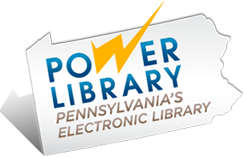
Teaching Research Skills to K-12 Students in The Classroom

Research is at the core of knowledge. Nobody is born with an innate understanding of quantum physics. But through research , the knowledge can be obtained over time. That’s why teaching research skills to your students is crucial, especially during their early years.
But teaching research skills to students isn’t an easy task. Like a sport, it must be practiced in order to acquire the technique. Using these strategies, you can help your students develop safe and practical research skills to master the craft.
What Is Research?
By definition, it’s a systematic process that involves searching, collecting, and evaluating information to answer a question. Though the term is often associated with a formal method, research is also used informally in everyday life!
Whether you’re using it to write a thesis paper or to make a decision, all research follows a similar pattern.
- Choose a topic : Think about general topics of interest. Do some preliminary research to make sure there’s enough information available for you to work with and to explore subtopics within your subject.
- Develop a research question : Give your research a purpose; what are you hoping to solve or find?
- Collect data : Find sources related to your topic that will help answer your research questions.
- Evaluate your data : Dissect the sources you found. Determine if they’re credible and which are most relevant.
- Make your conclusion : Use your research to answer your question!
Why Do We Need It?
Research helps us solve problems. Trying to answer a theoretical question? Research. Looking to buy a new car? Research. Curious about trending fashion items? Research!
Sometimes it’s a conscious decision, like when writing an academic paper for school. Other times, we use research without even realizing it. If you’re trying to find a new place to eat in the area, your quick Google search of “food places near me” is research!
Whether you realize it or not, we use research multiple times a day, making it one of the most valuable lifelong skills to have. And it’s why — as educators —we should be teaching children research skills in their most primal years.
Teaching Research Skills to Elementary Students
In elementary school, children are just beginning their academic journeys. They are learning the essentials: reading, writing, and comprehension. But even before they have fully grasped these concepts, you can start framing their minds to practice research.
According to curriculum writer and former elementary school teacher, Amy Lemons , attention to detail is an essential component of research. Doing puzzles, matching games, and other memory exercises can help equip students with this quality before they can read or write.
Improving their attention to detail helps prepare them for the meticulous nature of research. Then, as their reading abilities develop, teachers can implement reading comprehension activities in their lesson plans to introduce other elements of research.
One of the best strategies for teaching research skills to elementary students is practicing reading comprehension . It forces them to interact with the text; if they come across a question they can’t answer, they’ll need to go back into the text to find the information they need.
Some activities could include completing compare/contrast charts, identifying facts or questioning the text, doing background research, and setting reading goals. Here are some ways you can use each activity:
- How it translates : Step 3, collect data; Step 4, evaluate your data
- Questioning the text : If students are unsure which are facts/not facts, encourage them to go back into the text to find their answers.
- How it translates : Step 3, collect data; Step 4, evaluate your data; Step 5, make your conclusion
- How it translates : Step 1, choose your topic
- How it translates : Step 2, develop a research question; Step 5, make your conclusion
Resources for Elementary Research
If you have access to laptops or tablets in the classroom, there are some free tools available through Pennsylvania’s POWER Kids to help with reading comprehension. Scholastic’s BookFlix and TrueFlix are 2 helpful resources that prompt readers with questions before, after, and while they read.
- BookFlix : A resource for students who are still new to reading. Students will follow along as a book is read aloud. As they listen or read, they will be prodded to answer questions and play interactive games to test and strengthen their understanding.
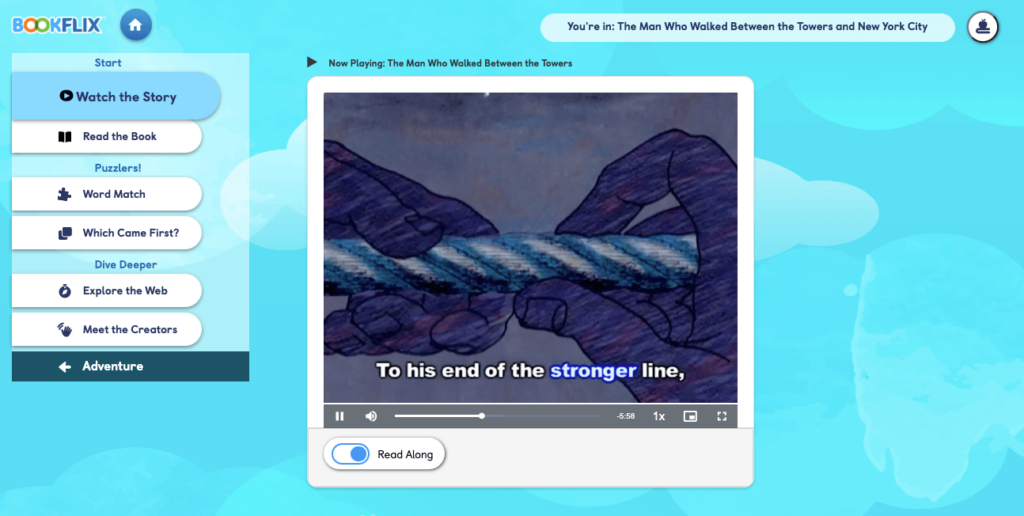
- TrueFlix : A resource for students who are proficient in reading. In TrueFlix, students explore nonfiction topics. It’s less interactive than BookFlix because it doesn’t prompt the reader with games or questions as they read. (There are still options to watch a video or listen to the text if needed!)
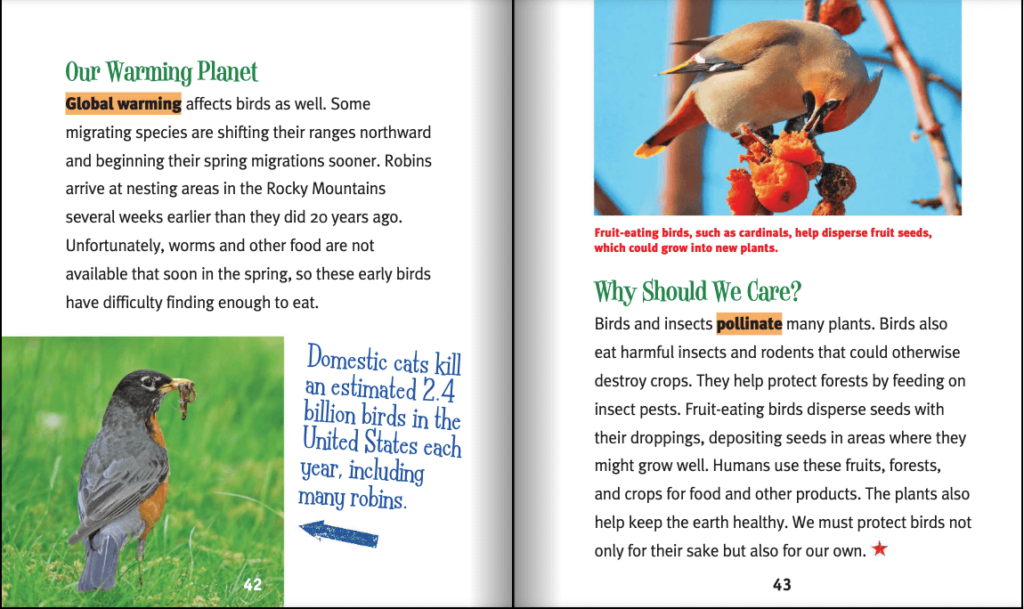
Teaching Research Skills to Middle School Students
By middle school, the concept of research should be familiar to students. The focus during this stage should be on credibility . As students begin to conduct research on their own, it’s important that they know how to determine if a source is trustworthy.
Before the internet, encyclopedias were the main tool that people used for research. Now, the internet is our first (and sometimes only) way of looking information up.
Unlike encyclopedias which can be trusted, students must be wary of pulling information offline. The internet is flooded with unreliable and deceptive information. If they aren’t careful, they could end up using a source that has inaccurate information!
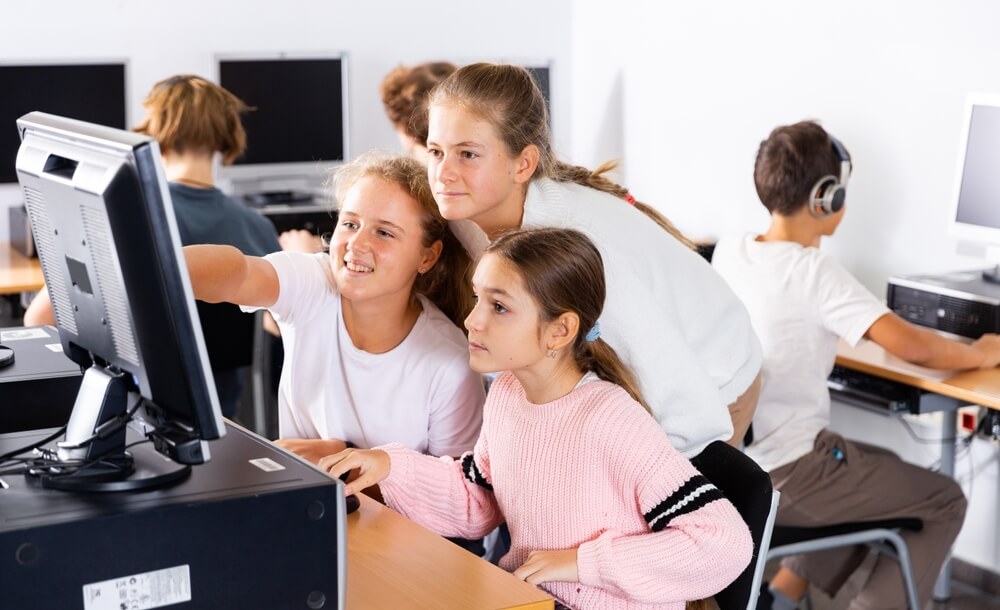
How To Know If A Source Is Credible
In general, credible sources are going to come from online encyclopedias, academic journals, industry journals, and/or an academic database. If you come across an article that isn’t from one of those options, there are details that you can look for to determine if it can be trusted.
- The author: Is the author an expert in their field? Do they write for a respected publication? If the answer is no, it may be good to explore other sources.
- Citations: Does the article list its sources? Are the sources from other credible sites like encyclopedias, databases, or journals? No list of sources (or credible links) within the text is usually a red flag.
- Date: When was the article published? Is the information fresh or out-of-date? It depends on your topic, but a good rule of thumb is to look for sources that were published no later than 7-10 years ago. (The earlier the better!)
- Bias: Is the author objective? If a source is biased, it loses credibility.
An easy way to remember what to look for is to utilize the CRAAP test . It stands for C urrency (date), R elevance (bias), A uthority (author), A ccuracy (citations), and P urpose (bias). They’re noted differently, but each word in this acronym is one of the details noted above.
If your students can remember the CRAAP test, they will be able to determine if they’ve found a good source.
Resources for Middle School Research
To help middle school researchers find reliable sources, the database Gale is a good starting point. It has many components, each accessible on POWER Library’s site. Gale Litfinder , Gale E-books , or Gale Middle School are just a few of the many resources within Gale for middle school students.

Teaching Research Skills To High Schoolers
The goal is that research becomes intuitive as students enter high school. With so much exposure and practice over the years, the hope is that they will feel comfortable using it in a formal, academic setting.
In that case, the emphasis should be on expanding methodology and citing correctly; other facets of a thesis paper that students will have to use in college. Common examples are annotated bibliographies, literature reviews, and works cited/reference pages.
- Annotated bibliography : This is a sheet that lists the sources that were used to conduct research. To qualify as annotated , each source must be accompanied by a short summary or evaluation.
- Literature review : A literature review takes the sources from the annotated bibliography and synthesizes the information in writing.
- Works cited/reference pages : The page at the end of a research paper that lists the sources that were directly cited or referenced within the paper.
Resources for High School Research
Many of the Gale resources listed for middle school research can also be used for high school research. The main difference is that there is a resource specific to older students: Gale High School .
If you’re looking for some more resources to aid in the research process, POWER Library’s e-resources page allows you to browse by grade level and subject. Take a look at our previous blog post to see which additional databases we recommend.
Visit POWER Library’s list of e-resources to start your research!

Library Services
UCL LIBRARY SERVICES
- Guides and databases
- Library skills
LibrarySkills@UCL
- Library skills support for academic programmes
- Welcome to LibrarySkills@UCL
- Pre-arrival
- Getting Started
- Assignments
- Independent research
- Information literacy for life
- UCL Special Collections and academic teaching
- ReadingLists@UCL for teaching staff
- Linking to library resources from your Moodle course
Further help
Library skills support for academic programmes or modules.
Students with library research skills are better placed to produce high quality academic work and to fully benefit from a research-based education.
Library skills incorporates the skills needed to effectively find, evaluate, manage and use information. It is essential for students to develop and refine their library and information literacy skills, knowledge and behaviours in order to achieve academic success and benefit their life beyond university, from the professional workplace to everyday living and participating in society.
Why include library skills teaching in your academic programme or module?
Library skills teaching is most effective when it is incorporated into academic programmes or modules, so students can attain and develop skills at the best and most relevant times, with enhanced teaching tailored to the programme of study. Where possible, library skills teaching should be integrated at different stages of the programme, with essential skills introduced when students first start at UCL, and more in-depth skills teaching offered at various stages, for example at points where students will be expected to do extended reading around their subject or in preparation for a particular research project or dissertation.

What does library skills teaching include?
We can advise on what is appropriate and relevant for your students, depending on their programme of study. Our teaching may include:
- Library induction: introduction to using UCL’s libraries and library resources;
- Searching for information using online resources including library catalogues, literature databases and data sources;
- In depth comprehensive literature searching;
- Evaluating information to assess its quality, relevance and validity;
- Citing references and avoiding plagiarism;
- Managing references using reference management software such as EndNote, Mendeley or Zotero;
- Skills relating to the research cycle and getting published, including understanding open access, research data management and bibliometrics.
What to do next
Consider library skills requirements in the planning stage of your academic programme or module and discuss embedding library-led inductions and teaching in consultation with the librarian for your subject. We can provide face-to-face or live online teaching sessions, tailored asynchronous learning materials, or a blended approach to delivery of teaching.
If your programme or module is already running, we can work with you to ensure your students get the support they need for essential skills development.
- Find and contact your subject specialist librarian
Supplementary library skills support for students
To complement and supplement library skills teaching that is incorporated into academic programmes, we offer additional library skills training and support covering the core library skills areas that we know to be important for all students: This can help refresh, reinforce and clarify students' skills, but should not be considered a substitute for tailored, discipline-specific library skills teaching.
- LibrarySkills@UCL for assignments Online guidance and asynchronous support for developing library skills required for assignments.
- LibrarySkills@UCL programme of training sessions Live online and face-to-face sessions on the core library skills areas that we know to be important for all students. Students from any discipline are welcome to book a place on these sessions.

See our library skills training sessions or contact your librarian .
For general enquiries, see Getting Help and contacting us .
LibrarySkills@UCL framework
The LibrarySkills@UCL framework illustrates the library skills, knowledge and behaviours that students may be encouraged to attain at varying stages of their journey at UCL. It can help form the basis for deciding on skills to incorporate into your teaching in liaison with your specialist librarian.
- An information literacy framework to inform LibrarySkills@UCL
Library skills and employability
Library and information literacy skills have benefits for life beyond university, from the professional workplace to everyday living and participating in society, and are skills included in UCL's Pillars of Employability.
- Introduction to UCL Pillars of Employability 3 minute summary of the UCL employability framework designed by UCL Careers.
- Library skills beyond university Find out how library and information literacy skills, knowledge and behaviours you develop at university are beneficial to you in your life beyond university, from the professional workplace to everyday living and participating in society.
- << Previous: Teaching staff
- Next: UCL Special Collections and academic teaching >>
- Last Updated: May 2, 2024 9:40 AM
- URL: https://library-guides.ucl.ac.uk/library-skills-ucl

Academic skills
Skills@Library supports taught students to develop academic skills, within the curriculum and through online resources, workshops, 1-2-1 consultations and drop-in sessions.

- Study and research support
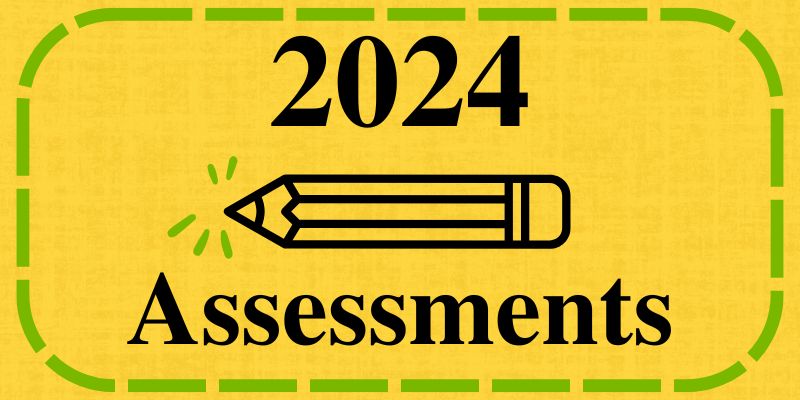
Practice makes perfect with past papers
Past papers are an excellent way to get an idea of what you're going to be asked in your exams, and a great tool to practicing your perfect answers.
Visit the past paper archive to give yourself the edge on examination day.
And check out our revision resourse rundown for even more assessment support from your Libraries.
Take your learning to the next level with Skills@Library. We help taught students to develop academic skills online and in person.
Academic integrity and plagiarism
Academic writing, critical thinking, digital capabilities, employability, maths and statistics, note making, referencing, revision and exams, searching for information, time management, assignments.
Struggling to write that essay? Not sure on how to write a report? Skills@Library can help you to complete your assignments.
Annotated bibliographies
Dissertations, essay writing, planning your assignments, presentations: oral, presentations: posters, reflective writing, report writing, editing and proofreading, skills development at university.
Whatever stage you’re at in your University journey, Skills@Library can help you to identify, develop and refine the academic skills you need.

Get off to a Flying Start! Find out about the skills you need at university and how it differs from what you’ve done before.
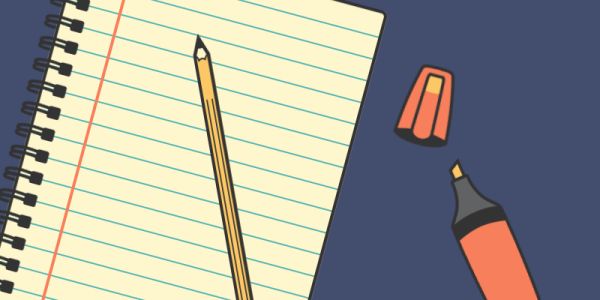
Second year
Step up to second year. Build on the skills you developed at first year and get to grips with the study techniques for second year success.
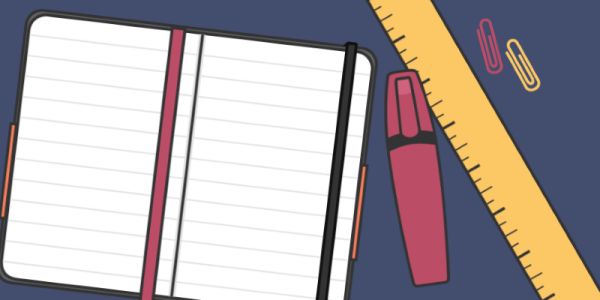
Tackle your final year project or dissertation. Our comprehensive guide takes you through all the stages of your Final Chapter at university.
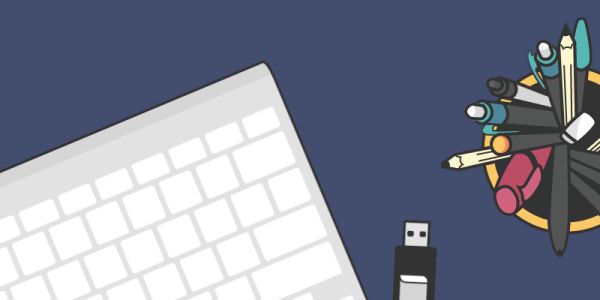
Step up to Masters and equip yourself with the academic skills you need to progress to postgraduate level.
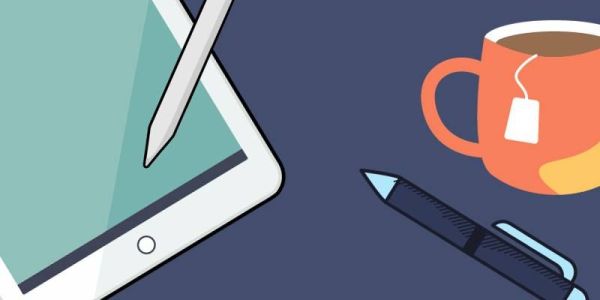
Mature students
Enhance your skills by exploring strategies and tools tailored to the mature student experience.

Postgraduate research
Thinking about applying to study for a postgraduate research degree? This resource aims to help you decide.
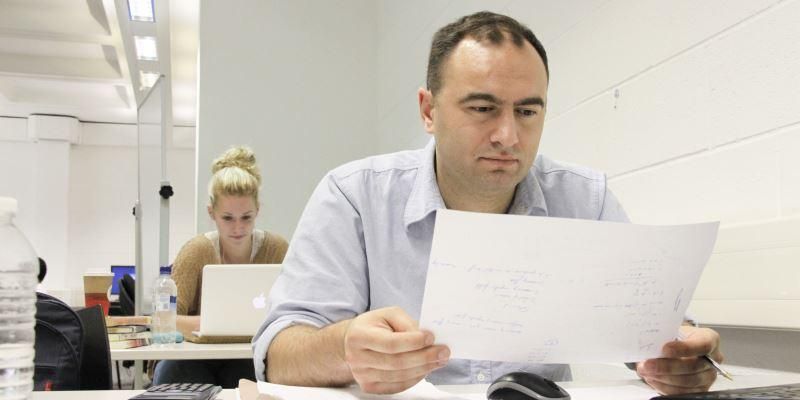
Skills@Library provide tailored sessions within the curriculum to support particular programmes of study. Find out what resources are available for you to use within lectures, online and in the virtual learning environment to support your students.
Stuck with searching? Six quick tips for finding information for your research
Resubmitting work here’s what you should consider .
3 weeks ago
Useful Links for Taught Students
on April 3, 2024
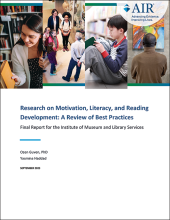
Final Report for the Institute of Museum and Library Services
Literacy development in the early childhood and elementary school years is critical for learning and the acquisition of other skills essential for educational achievement. Although schools typically assume the primary responsibility in developing children’s literacy and reading skills, a holistic approach to overall literacy development requires the involvement of other important actors, including parents, caregivers, community members, and libraries. Public libraries play a key role in the literacy landscape, especially by providing access to books and a variety of free literacy programs for families. The public library as a space and place that motivates kids to enjoy reading can lead to a lifelong love of learning. In summer 2023, IMLS commissioned a review of research literature that examines the effects of motivation to read and within reading programs in communities and, particularly, public libraries.
Key findings from this literature review identify research studies that focused on the effectiveness of reading strategies that emphasized motivations when promoting reading. This study summarizes several evidence-based practices tied to increasing motivation used during programs, instructional practices, and family engagement activities which are focused on child literacy and community participation.

IMAGES
VIDEO
COMMENTS
Read It. Learn about Scholarly Research Articles. Understand the structure of medical research articles to read more efficiently. Use the Structure of Scholarly Articles and Peer Review guide to learn more.. Includes a comparison of scholarly journals, professional trade journals, and popular or newstand magazines.; Learn about Primary, Secondary, and Tertiary Sources.
The authors and their lines of research can be tracked through the last 10 to 12 years of School Library Media Quarterly and School Library Media Annual, but as a point of reference for those who may not be familiar with this literature, a representative information problem solving model, The Big Six Skills Approach (Eisenberg and Berkowitz
1. Define your research question. Be the first to add your personal experience. 2. Choose your search tools. Be the first to add your personal experience. 3. Develop your search strategy. Be the ...
Our model illustrates the process in five steps, which map to the related knowledge and library skills covered in our guides. Plan your search. Understanding your search: Understanding your topic and the nature and extent of your library research task. Defining search terms: Identifying search concepts and alternative search terms.
Enhance your reading, note-taking and library skills to help you to research your assignment topics in a quicker, more effective, way.ContentMaking effective use of libraries at OxfordDeveloping your IT skillsReading Skills: using different sources Getting started with your readingFocusing reading on your essay questionAccessing reading materials onlineMaking effective use of
Research skills. Academic integrity. Digital skills. Research skills allow you to find information and use it effectively. It includes creating a strategy to gather facts and reach conclusions so that you can answer a question. Top tips. Starting your research. think about your topic - don't be too vague or too specific (try mind mapping or ...
A guide to foundation principles which are essential to building skills in all areas of information literacy and library skills. Library skills essentials. Getting started ; Assignments ... This tool is designed to help you consider and assess your confidence in undertaking the library research process and may be used to identify areas in which ...
Keep in mind, however, that the research process is rarely linear! As you go through this guide, try a few of your research ideas in the various sources linked. Keep a notepad ready to make a running list of keywords, phrases, theories, etc. that you can use for searches as you continue your topic investigation.
Research skills. Online course for Cambridge researchers about publishing, managing data, finding and disseminating research. Welcome to this Research Skills guide, brought to you by Cambridge University Libraries. Researchers interact with information every day. You might be looking for articles, evaluating sources, writing up work for ...
Core Library Research Skills for Success In order to ensure success as a graduate student in a research-based program such as the Msc in Management, you will need to develop your information literacy skills and apply them as part of your course work, the development of your research proposal, literature review, and written thesis.
The topics covered are subjects that will help you prepare for college-level research. Each module ends with an assessment to test your knowledge. The JSTOR librarians who helped create the course hope you learn from the experience and feel ready to research when you've finished this program. Select Module 1: Effective Searching to begin the ...
understand the steps involved in undertaking a thorough search for information. See 5 steps to effective library research. understand how to identify gaps in research and formulate a clear and focussed research question to address those gaps. See Understanding your search. be able to define the scope of your search based on the context and need.
Improving your research skills takes time and practice. Whether you are searching a library database or exploring Google, it is important to make a plan for your research and understand what kinds of sources you will find. This guide will show you how to search in library databases, search Google using advanced search tools, and evaluate your ...
LibGuides: Research Basics: an open academic research skills course: Lesson 1: Using Library Tools
Library 101 provides you with an overview of the basic library research skills needed to succeed in college.Regardless of your area of study, you can expect the skills acquired in Library 101 to make your searches for relevant and high-quality information for your assignments both simpler and more productive.Library 101 will cover:. The Research Process
A library research skills framework provides values, standards and skills for students at all levels (and educators) to work towards; it establishes learner expectations and allows for year-on-year development. A framework can offer a structure for up-to-date and consistent skills training for students. It also gives library and academic staff ...
The first step for conducting solid library research is to set concrete objectives. Also, the student must understand what the skill is that they are implementing in an assignment. For example, the student might be learning how to write citations in a bibliography or how to research databases. However, if the assignment makes assumptions that ...
Foundational library research skills for university students encompass a set of essential abilities that enable effective academic research. These skills include information literacy, which involves the ability to locate, assess, and utilize information from various sources, both online and within library collections.
Library Skills Toolkit. Librarians at academic institutions around the world have created hundreds of hours of content intended to help students develop and strengthen basic library and research skills. This toolkit is a carefully-curated collection of interactive tutorials and instructional videos that faculty may use as in-class activities or ...
Librarian Skills: Definitions, Examples and Tips. Librarians handle the everyday functions, organization and customer interactions of public and private libraries. To help the library run efficiently and better serve the library's patrons, librarians rely on certain skills. If you are interested in joining the library field or would like to ...
Before they begin to research, it is ideal to have a focused question. This 10 minute assignment teaches them how to turn a very broad topic into a focused research question. Identifying and Refining a Research Topic Using Concept Maps. This exercise is designed to help students think of words and concepts and see how they are related.
How it translates: Step 1, choose your topic. Setting reading goals: As a class, come up with 3-5 questions related to your book's topic before you start reading. After you read, use the text to answer the questions. How it translates: Step 2, develop a research question; Step 5, make your conclusion.
Students with library research skills are better placed to produce high quality academic work and to fully benefit from a research-based education. Library skills incorporates the skills needed to effectively find, evaluate, manage and use information. It is essential for students to develop and refine their library and information literacy ...
Academic skills. Skills@Library supports taught students to develop academic skills, within the curriculum and through online resources, workshops, 1-2-1 consultations and drop-in sessions. Library. Study and research support. Academic skills.
online resources and requests for library research instruction suggests that students and faculty view the library as an important part of the research process. Members of the nursing faculty at our institution have strongly supported the teaching of research skills and the use of the peer-reviewed journals and other professional literature.
The public library as a space and place that motivates kids to enjoy reading can lead to a lifelong love of learning. In summer 2023, IMLS commissioned a review of research literature that examines the effects of motivation to read and within reading programs in communities and, particularly, public libraries.